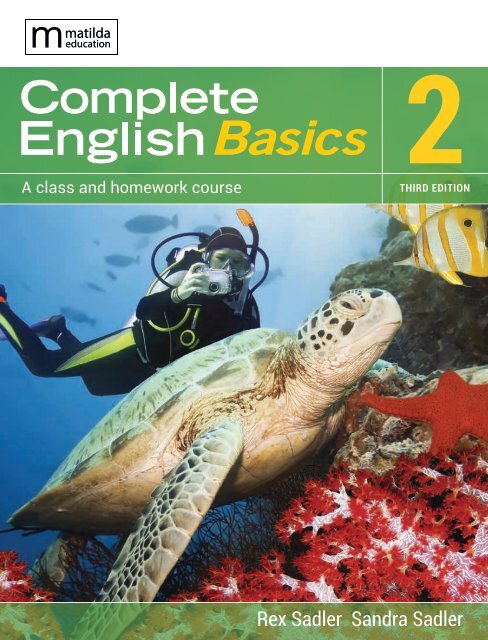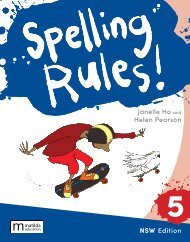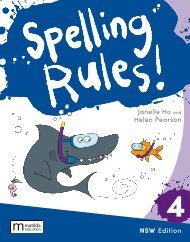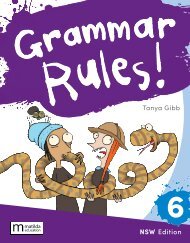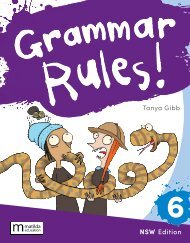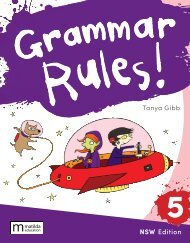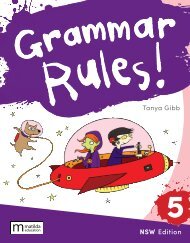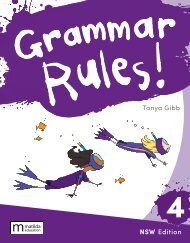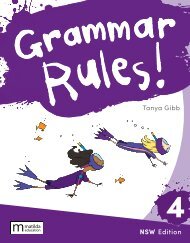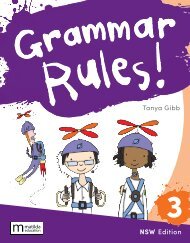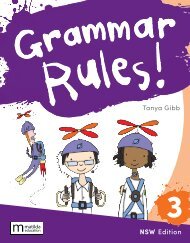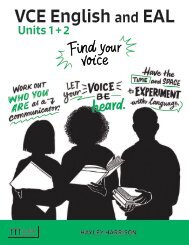Complete English Basics 2 student book sample/look inside
Create successful ePaper yourself
Turn your PDF publications into a flip-book with our unique Google optimized e-Paper software.
2<br />
A class and homework course<br />
THIRD EDITION<br />
Rex Sadler Sandra Sadler
This edition published in 2021 by<br />
Matilda Education Australia, an imprint<br />
of Meanwhile Education Pty Ltd<br />
Level 1/274 Brunswick St<br />
Fitzroy, Victoria Australia 3065<br />
T: 1300 277 235<br />
E: customersupport@matildaed.com.au<br />
www.matildaeducation.com.au<br />
First edition published in 2007 by<br />
Macmillan Science and Education Australia Pty Ltd<br />
Copyright © Rex Sadler and Sandra Sadler 2007, 2010, 2017<br />
The moral rights of the author have been asserted.<br />
All rights reserved.<br />
Except under the conditions described in the<br />
Copyright Act 1968 of Australia (the Act) and subsequent amendments,<br />
no part of this publication may be reproduced,<br />
stored in a retrieval system, or transmitted in any form or by any means,<br />
electronic, mechanical, photocopying, recording or otherwise,<br />
without the prior written permission of the copyright owner.<br />
Educational institutions copying any part of this <strong>book</strong><br />
for educational purposes under the Act must be covered by a<br />
Copyright Agency Limited (CAL) licence for educational institutions<br />
and must have given a remuneration notice to CAL.<br />
Licence restrictions must be adhered to. For details of the CAL licence contact:<br />
Copyright Agency Limited, Level 11, 66 Goulburn Street, Sydney, NSW 2000.<br />
Telephone: (02) 9394 7600. Facsimile: (02) 9394 7601. Email: memberservices@copyright.com.au<br />
Publication data<br />
Authors: Rex Sadler and Sandra Sadler<br />
Title: <strong>Complete</strong> <strong>English</strong> <strong>Basics</strong> 2: A Class and Homework Course<br />
ISBN: 978 1 4202 3708 5<br />
Publisher: Emma Cooper<br />
Project editor: Barbara Delissen<br />
Cover and text designer: Dim Frangoulis<br />
Production control: Janine Biderman and Katherine Fullagar<br />
Photo research and permissions clearance: Fiona Byrne and Vanessa Roberts<br />
Typeset in Heuristica Regular 10.5/12pt by DiZign Pty Ltd<br />
Cover image: Adobe Stock/Olga Khoroshunova<br />
Printed in Malaysia by Vivar Printing Pdt Ltd<br />
1 2 3 4 5 6 7 25 24 23 22 21 20<br />
Warning: It is recommended that Aboriginal and Torres Strait Islander peoples exercise caution when<br />
viewing this publication as it may contain images of deceased persons.
Contents<br />
Prefacevii<br />
Acknowledgementsviii<br />
1 Images and words 1<br />
Comprehension Film poster 1<br />
Cartoon 3<br />
Spelling and vocabulary Behaviour 4<br />
Language What is a clause? 6<br />
Main clauses 6<br />
Dependent (subordinate) clauses 6<br />
Punctuation How well do you punctuate? 8<br />
The craft of writing The graphic novel 8<br />
2 Factual texts 10<br />
Comprehension Information report 10<br />
Autobiography 12<br />
Spelling and vocabulary Confusing pairs 14<br />
Language Dependent (subordinate) clauses 15<br />
Punctuation Reviewing punctuation 17<br />
The craft of writing Autobiography 18<br />
3 Planet Earth 19<br />
Comprehension Global warming 19<br />
Spelling and vocabulary The Earth 21<br />
Language Nouns 22<br />
Punctuation Starting and finishing sentences 23<br />
The craft of writing Problems of planet Earth 25<br />
4 This sporting life 26<br />
Comprehension The race 26<br />
Spelling and vocabulary Sport 28<br />
Language Proper and common nouns 30<br />
Punctuation Punctuating fables 31<br />
The craft of writing Becoming a better writer 32<br />
978 1 4202 3708 5<br />
iii
iv Contents<br />
978 1 4202 3708 5<br />
5 Hard times 33<br />
Comprehension Shoes 33<br />
Spelling and vocabulary Money matters 35<br />
Language Collective nouns 36<br />
Abstract nouns 37<br />
Punctuation The full stop, question mark and exclamation mark 38<br />
The craft of writing Poverty 39<br />
6 Inventions40<br />
Comprehension Credit cards 40<br />
Shopping trolleys 41<br />
Spelling and vocabulary Inventions and discoveries 42<br />
Language Singular and plural nouns 43<br />
Forming plural nouns 44<br />
Punctuation Commas 45<br />
The craft of writing Describing objects 46<br />
7 War and peace 47<br />
Comprehension The hiding place 47<br />
Spelling and vocabulary In the line of fire 49<br />
Language More plural nouns 50<br />
Punctuation Statements and questions 52<br />
The craft of writing War and peace 53<br />
8 All about people 54<br />
Comprehension Robyn 54<br />
Spit Nolan 55<br />
Spelling and vocabulary Up-front and personal 56<br />
Language Using adjectives 58<br />
Punctuation Apostrophes 59<br />
The craft of writing Using details to describe people 60<br />
9 In the wild 61<br />
Comprehension Stingrays 61<br />
Spelling and vocabulary Creatures in the wild 63<br />
Language Adjectives of comparison 64<br />
Punctuation Capital letters 66<br />
The craft of writing The world of animals 67<br />
10 Music, music, music 68<br />
Comprehension ‘The nocturne in the corner phonebox’ 68<br />
Spelling and vocabulary The sound of music 70<br />
Language Onomatopoeia 72<br />
Punctuation Punctuating dialogue 73<br />
The craft of writing Using sound words 74
978 1 4202 3708 5<br />
Contents<br />
<br />
v<br />
11 The world of <strong>book</strong>s 75<br />
Comprehension The emu 75<br />
Banana fact file 76<br />
Spelling and vocabulary All about <strong>book</strong>s 77<br />
Language Synonyms 78<br />
Antonyms 79<br />
Homonyms 79<br />
Punctuation Using the apostrophe to abbreviate words 80<br />
The craft of writing What’s that you’re reading? 81<br />
12 Places82<br />
Comprehension Beneath the sea 82<br />
Spelling and vocabulary Describing places 84<br />
Language Personal pronouns 85<br />
Punctuation Direct and indirect speech 87<br />
The craft of writing Describing a place 88<br />
13 School days 89<br />
Comprehension Conflict in the classroom 89<br />
Spelling and vocabulary Education 91<br />
Language Verbs 92<br />
Punctuation Using the apostrophe to show ownership 94<br />
The craft of writing School days 95<br />
14 Disaster96<br />
Comprehension Plane crash in the Andes 96<br />
Spelling and vocabulary Emergency 98<br />
Language Verbs tell time 99<br />
Punctuation Apostrophes—avoiding confusion 101<br />
The craft of writing Narratives 102<br />
15 On the farm 103<br />
Comprehension A plague of locusts 103<br />
Spelling and vocabulary On the land 105<br />
Language Present participles 106<br />
Forming present participles 107<br />
Punctuation Using commas 107<br />
The craft of writing Plagues and epidemics 109<br />
16 Health 110<br />
Comprehension What it feels like to be stuck in a tornado 110<br />
Spelling and vocabulary The human body 112<br />
Language Past participles 113<br />
Punctuation Abbreviations 115<br />
The craft of writing Describing feelings 116
vi Contents<br />
978 1 4202 3708 5<br />
17 Abandon ship! 117<br />
Comprehension Torpedoed 117<br />
Spelling and vocabulary On the move 119<br />
Language Adverbs 120<br />
Forming adverbs 121<br />
Punctuation Colons 122<br />
The craft of writing The force of nature 123<br />
18 Let’s go to the movies 124<br />
Comprehension ‘A bundle of twists in a dragon’s tale: Eragon’ 124<br />
Spelling and vocabulary At the movies 126<br />
Language Idioms 127<br />
Punctuation Paragraphs 129<br />
The craft of writing Writing a film review 130<br />
19 Read all about it! 131<br />
Comprehension ‘Paraglider pilot survives horror storm ascent’ 131<br />
Spelling and vocabulary The newspaper 133<br />
Language Prefixes 134<br />
Punctuation Quotation marks for speech 135<br />
The craft of writing A news report 137<br />
20 The great outdoors 138<br />
Comprehension Rapids ahead! 138<br />
Spelling and vocabulary In the wilderness 140<br />
Language Conjunctions 141<br />
Punctuation Question marks and exclamation marks in speech 143<br />
The craft of writing Untamed lands 144<br />
21 Careers145<br />
Comprehension A day in the life of a naturalist 145<br />
Spelling and vocabulary People at work 147<br />
Language Suffixes 148<br />
Punctuation Revision—punctuating sentences 149<br />
The craft of writing What I would like to be 150<br />
22 Numbers, shapes and sizes 151<br />
Comprehension The great pyramids of Egypt 151<br />
Spelling and vocabulary Counting and measuring 153<br />
Language Numbers as adjectives 154<br />
Numbers and prefixes 155<br />
Punctuation Revision—punctuating sentences 156<br />
The craft of writing How/why did it happen? 157<br />
Back-of-the-<strong>book</strong> dictionary 158
Preface<br />
<strong>Complete</strong> <strong>English</strong> <strong>Basics</strong> 2 sets out to present essential <strong>English</strong> skills in an interesting and<br />
meaningful way for junior secondary <strong>student</strong>s.<br />
This third edition covers essential language and literacy skills underpinning the Australian<br />
curriculum. It incorporates a wide range of comprehension texts, spelling and vocabulary<br />
development, as well as language work on sentences, phrases, parts of speech, word families and<br />
paragraphing. It is important to note that eleven creative writing and punctuation units have been<br />
added to this new edition.<br />
The work<strong>book</strong> can be used as a class or homework text. One approach would be to have<br />
<strong>student</strong>s complete each unit over a two-week period.<br />
The stimulus materials and exercises are designed to improve comprehension and vocabulary<br />
skills, as well as language usage and spelling. A special feature is the back-of-the-<strong>book</strong> dictionary, which<br />
encourages <strong>student</strong>s to expand their vocabulary by <strong>look</strong>ing up the meanings of unfamiliar words.<br />
Correct spelling is essential for good communication. Research has shown that in those<br />
classrooms where teachers are concerned about correct spelling and vocabulary enrichment, the<br />
<strong>student</strong>s’ spelling level improves significantly. It is a good idea, if time allows, to have a brief spelling<br />
test at the end of each unit using the words from the spelling and vocabulary list.<br />
The extracts are engaging and cover a diverse range of topics—from tornadoes to Egyptian<br />
pyramids. A range of genres is represented including biography, crime, fiction and adventure.<br />
Above all, we hope that <strong>student</strong>s will enjoy their studies as they gain basic <strong>English</strong> skills.<br />
Rex and Sandra Sadler<br />
978 1 4202 3708 5<br />
vii
Acknowledgements<br />
The author and publisher are grateful to the following for permission to reproduce copyright material:<br />
Photographs<br />
ALAMY/A.F. ARCHIVE, 81, 124, /Archive Images, 144, /<br />
Movie Stills, 130; Cartoonstock/Mark Lynch, 3; FAIRFAX<br />
SYNDICATION/Dean Osland, 54; GETTY IMAGES/Archive<br />
Photos/Stringer, 46, /Brendon Thorne, 123, /Corbis/<br />
VCG, 28, ISTOCKPHOTO/, 26, /4x6, 40, /Aimin Tang,<br />
47, /Alfsky, 89, /Amanda Rohde, 56, /AmmentorpDK, 4,<br />
/-Antonio-, 157, /bjones27, 126, /blackred, 32, /btrenkel,<br />
84, /Craig Dingle, 147, /Craig Dingle, 35, /davidf, 153,<br />
/donald_gruener, 110, /dra_schwartz, 91, /edelmar,<br />
103, /Fatman73, 76, /Forest Woodward, 112, /Geir-Olav<br />
Lyngfjell, 140, /GlobalP, 14, /Ingvald kaldhussæter, 33, /<br />
Island Effects, 82, /Jan Wolffgang, 67, /John Pitcher, 145,<br />
/Justin Horrocks, 98, /karimhesham, 151, /kcline, 42, /<br />
Kenneth Canning, 10, /kevinruss, 116, /kevinruss, 117, /<br />
kirstypargeter, 77, /kmaassrock, 133, /Lise Gagne, 105, /<br />
MR1805, 119, /Nathan Jaskowiak, 96, /oscarhdez, 102,<br />
/Rafal Olkis, 49, /Robert Pernell, 138, /Saivann, 68, /<br />
SandraKavas, 88, /shironosov, 18, /susan flashman,<br />
75, /Tim Mccaig, 70, /vlad_karavaev, 39; Newspix/<br />
James Croucher, 131; Photos.com, 60, 61, 63, 74;<br />
SHUTTERSTOCK/Albie Venter, 21, /Alex Hinds, Design<br />
element, /M. Shcherbyna, 25, /Shcherbinator, 137, /<br />
Simon_g, 109, /Tifonimages, 19, /wavebreakmedia, 150,<br />
The Kobal Collection/20th Century Fox, 1.<br />
Other material<br />
‘Treasure Island’ image panel adapted by Seymour Reit,<br />
art by Ernie Colón, lettering by George Roberts and<br />
colours by Luisa Colón from Treasure Island by Robert<br />
Louis Stevenson. Copyright © 1995 by Bank Street College<br />
of Education. Reproduced by permission of Bank Street<br />
College of Education, 9; Extract from Whitaker’s World of<br />
Facts by Russell Ash, Bloomsbury, 2005, 76; Extract from<br />
True Spirit by Jessica Watson, Hachette, 2010, 123; Cover<br />
and extract from Twopence to Cross the Mersey, reprinted<br />
by permission of HarperCollins Publishers Ltd, © 1981<br />
Helen Forrester, 12–13; Extract ‘Attacked by a swarm of<br />
African killer bees’ from What It Feels Like, reprinted by<br />
permission of Harper Collins Publishers Ltd © 2003 Edited<br />
by AJ Jacobs, 109; Extract ‘What it feels like to be stuck in a<br />
tornado’ by John Neidigh from What It Feels Like, reprinted<br />
by permission of Harper Collins Publishers Ltd © 2003<br />
Edited by AJ Jacobs, 110; Extract from Angela’s Ashes,<br />
reprinted by permission of HarperCollins Publishers Ltd,<br />
© 1996 Frank McCourt, 33–4; Extract from The Overloaded<br />
Ark by Gerald Durrell, Faber and Faber, 1953, 145–6;<br />
Extract from Blueback by Tim Winton, Jenny Darling and<br />
Associates, 82–3, 85; Extract from Lockie Leonard, Human<br />
Torpedo by Tim Winton, Jenny Darling and Associates,<br />
89–90; Extract from The Habit of Loving, Copyright ©<br />
1978 by Doris Lessing, Featured by kind permission of<br />
Jonathan Clowes Ltd., London, on behalf of The Estate of<br />
Doris Lessing, 103–4; Extract from Macquarie Compact<br />
Dictionary, 2014, 75; Extract from The Book Thief by<br />
Markus Zusak reprinted by permission of Pan Macmillan<br />
Australia Pty Ltd. Copyright © Markus Zusak 2005, 81;<br />
Extract from Tomorrow, When the War Began by John<br />
Marsden reprinted by permission of Pan Macmillan<br />
Australia Pty Ltd. Copyright © JLM Pty Ltd 1993, 54;<br />
Extract from Mao’s Last Dancer by Li Cunxin, Penguin<br />
Books Australia, 2003, 39; Cover of Little Brother by Alan<br />
Baillie, Puffin, 2004, Penguin Australia Pty Ltd, 53; Cover<br />
and extract from The Chocolate War by Robert Cormier,<br />
copyright © 1974 by Robert Cormier. Used by permission<br />
of Random House Children’s Books, a division of Penguin<br />
Random House LLC. All rights reserved, 95; Extract from<br />
Cold River by William Judson, copyright © 1974 by Cork<br />
Tree, Inc. Used by permission of New American Library,<br />
an imprint of Penguin Publishing Group, a division of<br />
Penguin Random House LLC, 138; ‘Chapter three’ from<br />
The Cay by Theodore Taylor, copyright © 1969 by Theodore<br />
Taylor. Used by permission of Delacorte Press, an imprint<br />
of Random House Children’s Books, a division of Penguin<br />
Random House LLC. All rights reserved, 117–18; Extract<br />
from Spit Nolan by Bill Naughton reprinted by permission<br />
of Peters Fraser & Dunlop (www.petersfraserdunlop.<br />
com) on behalf of the Estate of Bill Naughton, 55; Extract<br />
from Alive by Piers Paul Read, Random House, 1974,<br />
96–7; Extract from The Silver Sword by Ian Serraillier,<br />
Random House, 1956, 47; Extract from Frozen Fire: A Tale<br />
of Courage by James Houston, Simon Schuster, 1992, 67;<br />
‘A bundle of twists in a dragon’s tale’ by Paul LePetit, in<br />
The Sunday Telegraph, 17 Dec 2006, 124; E.T. film review<br />
by Paul LePetit, in The Sunday Telegraph TV Guide, 24 Dec<br />
2006, 130; ‘The nocturne in the corner phonebox’, by<br />
Andrew Taylor, 68; Extract from Dougy by James Maloney,<br />
University of Queensland Press, 1993, 26; ‘Paraglider<br />
pilot survives horror storm ascent’ by DD McNicoll, The<br />
Weekend Australian, 17 Feb 2007, 131–2.<br />
The author and publisher would like to acknowledge the<br />
following:<br />
Extract from Little Brother by Alan Baillie, Puffin, 2004,<br />
53; Extract from Frozen Fire: A Tale of Courage by James<br />
Houston, Estate of James Houston, 1992, 67.<br />
While every care has been taken to trace and acknowledge<br />
copyright, the publisher tenders their apologies for any<br />
accidental infringement where copyright has proved<br />
untraceable. They would be pleased to come to a suitable<br />
arrangement with the rightful owner in each case.<br />
viii 978 1 4202 3708 5
Images<br />
and words<br />
1<br />
Comprehension<br />
Film poster<br />
Look at the film poster and answer the questions that follow.<br />
978 1 4202 3708 5<br />
1
2 <strong>Complete</strong> <strong>English</strong> <strong>Basics</strong> 2<br />
978 1 4202 3708 5<br />
Reading for understanding<br />
1 What is the advertiser’s purpose in creating this poster?<br />
2 In this poster, what immediately draws the audience’s attention? Why?<br />
3 How are the scissor hands positioned in relation to the two characters?<br />
4 How does the poster’s image show that the film is a love story?<br />
5 Which words in the poster indicate that the young woman is attracted to Edward?<br />
6 Which words tell the audience about the character of Edward?<br />
7 ‘… an uncommonly gentle man.’ Why do we wonder whether Edward can be gentle?<br />
8 How does the film image suggest that Edward is the main character?<br />
9 Why do you think the advertiser mentions two of the director’s previous films, Batman<br />
and Beetlejuice ?<br />
10 Why do you think the title has ‘edward’ in lower case and ‘SCISSORHANDS’ in capital<br />
letters?<br />
11 What emotions are presented in the image?<br />
12 What else in the image, other than his hands, suggests that Edward is an unusual<br />
character?<br />
12 marks
978 1 4202 3708 5<br />
1 Images and words 3<br />
Cartoon<br />
Reading for understanding<br />
1 What is the cartoonist’s purpose?<br />
2 How do the survivors know that they have reached civilisation?<br />
3 How does the cartoonist show that the survivors have endured much hardship?<br />
4 What emotions do the survivors experience when they see the garbage floating on the<br />
water?<br />
5 What has the cartoonist identified about our society’s values?<br />
5 marks
4 <strong>Complete</strong> <strong>English</strong> <strong>Basics</strong> 2<br />
978 1 4202 3708 5<br />
Spelling and vocabulary<br />
Behaviour<br />
guess defiance gratitude similarity truly<br />
perfection juvenile confiscate observant anonymous<br />
praise resistance impostor prohibit amiable<br />
stupidity minority completely prevention degradation<br />
unanimous rejection noisily patriotism compulsory<br />
respectable impulsive permit difficulties hurriedly<br />
Finding list words<br />
Use list words to complete these sentences.<br />
1 is the opposite of majority.<br />
2 is the adverb formed from hurry.<br />
3 is the plural of difficulty.<br />
4 is the opposite of quietly.<br />
5 is the adjective formed from impulse.<br />
6 means having no name or authorship.<br />
7 is the adverb formed from true.<br />
8 means of, or for, young people.<br />
9 means love of one’s country.<br />
10 is the noun formed from defy.<br />
11 is the adjective formed from observe.<br />
12 means everyone is in complete agreement.<br />
13 is the adverb formed from complete.<br />
14 means to seize or take away.<br />
15 is the state of being similar.<br />
16 means to express approval or admiration of.<br />
17 is the adjective formed from compel.<br />
18 means friendly and good-natured.<br />
19 is a verb meaning to forbid or prevent.<br />
20 means good, or worthy of respect.<br />
20 marks
978 1 4202 3708 5<br />
1 Images and words 5<br />
Word skills<br />
1 Form nouns ending in ‘-ion’ for each of the following list words.<br />
a permit d confiscate<br />
b prohibit e compulsory<br />
c observant f completely<br />
2 Write a list word similar in meaning to each of the following words.<br />
a allow c totally<br />
b sincerely d foolishness<br />
3 Write a list word opposite in meaning to each of the following words.<br />
a voluntary c slowly<br />
b quietly d ingratitude<br />
14 marks<br />
Adding list words<br />
<strong>Complete</strong> the following by using appropriate words from your list. The first letter of each word<br />
is given to help you. Use each list word once only.<br />
The quest for freedom<br />
The r group had made a u decision to depose<br />
the i who was trying to p them from gaining a democracy.<br />
An a letter had been h circulated and the people<br />
showed their d by an i attack on the parliament building.<br />
A r<br />
recognise the d<br />
should have the power to c<br />
member of the community pleaded that the dictator should<br />
faced by the people and demanded that he no longer<br />
their properties.<br />
Back-of-the-<strong>book</strong> dictionary<br />
The list word ‘permit’ is made up of two Latin words: per meaning<br />
‘through’ and mitto, meaning ‘I send’. ‘To permit’ is ‘to send somebody<br />
through’ or ‘to let someone pass through’. There are many words in<br />
<strong>English</strong> that begin with the Latin prefix per-. Here are a few of them.<br />
Using the back-of-the-<strong>book</strong> dictionary, write their meanings.<br />
percolate:<br />
perennial:<br />
perforate:<br />
persist:<br />
permeable:<br />
11 marks<br />
5 marks
6 <strong>Complete</strong> <strong>English</strong> <strong>Basics</strong> 2<br />
978 1 4202 3708 5<br />
Language<br />
What is a clause?<br />
A clause is a group of words expressing a complete thought. A clause contains a subject and a verb.<br />
Clauses are often joined together to form sentences. The following sentence is made up of a<br />
main clause and two dependent clauses.<br />
Owls are able to catch small animals because they have strong night vision,<br />
which enables them to see in the dark.<br />
Dependent clause<br />
(The first dependent clause begins with the conjunction ‘because’ and the second with the relative<br />
pronoun ‘which’.)<br />
Main clauses<br />
Main clause<br />
Dependent clause<br />
A main clause (also called a principal clause or independent clause) contains a verb and a subject.<br />
It usually makes sense on its own and may also form a complete sentence in itself.<br />
A burst of lightning lit up the sea.<br />
It very often combines with other main and dependent clauses to form sentences.<br />
Main clause<br />
Conjunction<br />
Falcons are not huge birds, but they can fly very fast.<br />
Please note: in the above sentence the two main clauses are joined by the coordinating conjunction<br />
‘but’.<br />
Dependent (subordinate) clauses<br />
Main clause<br />
A dependent clause (also known as a subordinate clause) is a group of words that has both a<br />
subject and a verb, but it cannot stand alone as a sentence.<br />
It is not able to function by itself. It usually begins with a conjunction or a relative pronoun,<br />
as seen in the dependent clauses in bold below.<br />
Dark clouds scudded across the horizon as the storm approached.<br />
The old man, who was smiling happily, hugged his grandchild.<br />
Identifying clauses<br />
Identify the clauses as set out in each example.<br />
1 When he was nearly thirteen, my brother Jem got his arm badly broken at the elbow.<br />
from To Kill a Mockingbird by Harper Lee<br />
Dependent clause:<br />
Main clause:
978 1 4202 3708 5<br />
1 Images and words 7<br />
2 Once there were four children whose names were Peter, Susan, Edmund and Lucy.<br />
Main clause:<br />
Dependent clause:<br />
from The Lion, the Witch and the Wardrobe by CS Lewis<br />
3 He was an old man who fished alone in a skiff in the Gulf Stream and he had gone<br />
eighty-four days now without taking a fish.<br />
from The Old Man and the Sea by Ernest Hemingway<br />
Main clause 1:<br />
Dependent clause:<br />
Main clause 2:<br />
4 Once upon a time there were four little rabbits, and their names were Flopsy, Mopsy,<br />
Cotton-tail and Peter.<br />
from The Tale of Peter Rabbit by Beatrix Potter<br />
Main clause 1:<br />
Main clause 2:<br />
5 When Mr Bilbo Baggins of Bag End announced that he would shortly be celebrating his<br />
eleventy-first birthday with a party of special magnificence, there was much talk and<br />
excitement in Hobbiton.<br />
from The Lord of the Rings by JRR Tolkien<br />
Dependent clause 1:<br />
Dependent clause 2:<br />
Main clause:<br />
6 All animals are equal, but some are more equal than others.<br />
from Animal Farm by George Orwell<br />
Main clause 1:<br />
Main clause 2:<br />
7 The drought had lasted now for ten million years, and the reign of the terrible lizards had<br />
long since ended.<br />
from 2001: A Space Odyssey by Arthur C Clarke<br />
Main clause 1:<br />
Main clause 2:<br />
8 A woman must have money and a room of her own if she is to write fiction.<br />
Main clause:<br />
Dependent clause:<br />
from A Room of One's Own by Virginia Woolf<br />
18 marks
8 <strong>Complete</strong> <strong>English</strong> <strong>Basics</strong> 2<br />
978 1 4202 3708 5<br />
Punctuation<br />
How well do you punctuate?<br />
Imagine where we’d be without punctuation. We’d have no sentences or paragraphs. There would<br />
be no capital letters to tell us where to begin a sentence, no full stops to tell us where to end one,<br />
and no commas to tell us where to pause. There would just be a never-ending block of print or<br />
writing. Reading a <strong>book</strong>, newspaper or magazine would be intolerable.<br />
To give you an idea of what it would be like, here is a dramatic paragraph taken from the<br />
classic novel Swiss Family Robinson by Johann Rudolf Wyss. Your task is to rewrite the paragraph<br />
adding capital letters, full stops and commas. The number of sentences that you need to use is<br />
indicated in the brackets at the end.<br />
Encounter with a boa constrictor<br />
after the donkey ran from the beach it arrived at the lair of the snake and stopped<br />
although the donkey realised its danger it could not move the poor animal should have<br />
fled but it stood fascinated and uttered a low groan the boa its hungry jaws wide open<br />
approached steadily until it was within striking distance the donkey could not move<br />
because it was paralysed with fear it gazed at the monster that quickly wound its long<br />
scaly body around him and then suffocated him in the horrible embrace we shuddered as<br />
we <strong>look</strong>ed at the fearful sight<br />
(seven sentences)<br />
from Swiss Family Robinson by Johann Rudolf Wyss<br />
The craft of writing<br />
The graphic novel<br />
A graphic novel is a novel in a comic-strip format. It is a long story told in pictures and words. It<br />
features:<br />
• panels comprising words and pictures that show action and movement to develop the<br />
story<br />
• gutters, which are the spaces between the panels<br />
• speech balloons that enclose the dialogue<br />
• caption boxes containing information about a scene or character<br />
• visual sound effects using special lettering and onomatopoeia (e.g. ‘kapow!’).<br />
7 marks
978 1 4202 3708 5<br />
1 Images and words 9<br />
Creating graphic novel panels<br />
Many famous novels have been changed into graphic novels. Here are two panels from a graphic<br />
novel derived from Treasure Island by Robert Louis Stevenson. Notice how the combination of<br />
words and images brings the story to life. Now try your hand at converting an incident or scene<br />
from a novel, poem or story you have been reading. Four panels are provided for you to use.
2<br />
Factual texts<br />
Comprehension<br />
Read the following two texts and answer the questions.<br />
Information report<br />
Polar bears<br />
POLAR bears live in five countries— United<br />
States (Alaska), Canada, Russia, Greenland and<br />
Norway. Some have been seen near the North<br />
Pole but this is unusual as there is not much food<br />
there for them.<br />
They are the largest land carnivore. The males<br />
grow two to three times larger than the females.<br />
Their skin is black and their fur completely<br />
covers their body except for their nose and the<br />
soles of their feet. They shed their fur completely<br />
once a year and then re-grow their coat. Although<br />
the fur <strong>look</strong>s white or creamy yellow, each hair is<br />
transparent and hollow. This special type of hair<br />
transmits the sun’s heat directly to the base of<br />
the hair where it is absorbed by the black skin.<br />
Amazingly, polar bears are so well insulated they<br />
tend to overheat, so they move slowly and take<br />
regular rests. The excess heat is released through<br />
blood vessels close to the skin.<br />
Polar bears are strong swimmers and can<br />
swim up to 95 kilometres without resting. They<br />
can also swim underwater for up to two minutes<br />
by flattening their ears against their head and<br />
closing their nostrils.<br />
They mainly eat seals but will also eat carcasses<br />
of beluga whales, walruses, etc. Occasionally<br />
they themselves will kill young walruses and<br />
beluga whales. When food is scarce they will eat<br />
small rodents, seabirds, eggs, berries, kelp and<br />
even human garbage. They do not drink water<br />
because they get all the fluid they need from<br />
their food. Hungry polar bears that come into<br />
towns and camping sites <strong>look</strong>ing for food are very<br />
dangerous and, if they attack, a human has little<br />
chance of surviving. Bears that attack humans are<br />
most often young adults and mothers with cubs.<br />
Most females give birth to two cubs once<br />
every three years. They enter a den where they<br />
sleep deeply. Their heart rate slows and their<br />
temperature drops slightly. This sleep is different<br />
to hibernation and the bears can be roused<br />
quickly if necessary. They give birth while in this<br />
deep sleep and remain in the den with the cubs<br />
until the outside temperature rises and the young<br />
cubs are able to travel.<br />
In 1968 the polar bear population was reported<br />
to be 10 000 but because government regulations<br />
now limit hunting, the population is now<br />
estimated to be between 21 000 and 28 000. Even<br />
so, polar bears are classified as ‘threatened’.<br />
Polar bears hunt from large platforms of ice<br />
called pack ice. Global warming is causing the<br />
ice to melt and the bears are forced to hunt<br />
from these platforms for shorter periods of<br />
time. This means that many are starving or<br />
are undernourished. Older, weaker bears in<br />
particular are prone to starvation.<br />
10 978 1 4202 3708 5
978 1 4202 3708 5<br />
2 Factual texts 11<br />
Reading for understanding<br />
Choose the correct answer for each of the following.<br />
1 Polar bears live mainly<br />
a at the North Pole.<br />
b in five different countries.<br />
c in dens.<br />
2 The bears’ diet<br />
a can be quite varied.<br />
b never includes plant matter.<br />
c would never include human’s food.<br />
3 The male bears<br />
a are a similar size to the females.<br />
b are the largest land carnivores.<br />
c cannot swim underwater.<br />
4 Polar bears<br />
a have pure white fur.<br />
b are poorly insulated.<br />
c have black skin.<br />
5 Female bears usually<br />
a give birth to a single cub.<br />
b take the cubs out of the den soon after their birth.<br />
c give birth to cubs once every three years.<br />
6 Since 1968 the polar bear population<br />
a has increased.<br />
b has decreased.<br />
c has remained stable.<br />
7 Polar bears<br />
a are likely to increase in numbers.<br />
b are completely protected from hunters.<br />
c are a threatened species.
12 <strong>Complete</strong> <strong>English</strong> <strong>Basics</strong> 2<br />
978 1 4202 3708 5<br />
8 Global warming<br />
a has had little effect on polar bears.<br />
b shortens the length of time bears can hunt.<br />
c has meant that fewer cubs survive.<br />
9 A female polar bear<br />
a gives birth to cubs while in a deep sleep.<br />
b hunts for food during the winter months.<br />
c hibernates during the coldest months.<br />
10 Polar bears<br />
a react well to humans.<br />
b prefer human’s food to seals.<br />
c are willing to kill humans if disturbed.<br />
10 marks<br />
Autobiography<br />
A young teacher asked me, as I stood uncertainly<br />
in the hall, what courses I wanted to take.<br />
I was aghast. I had no idea what courses to<br />
take. All I wanted was to continue my education<br />
from where I had left off nearly three years<br />
earlier.<br />
‘I’m not sure,’ I managed to mutter. ‘I know I<br />
need to learn arithmetic.’<br />
She pointed to an open doorway farther down<br />
the hall.<br />
‘Try <strong>book</strong>keeping,’ she said kindly, as she<br />
turned to attend to another lost youngster.<br />
I did not know what <strong>book</strong>keeping was, but<br />
I was so scared of the shifting, staring young<br />
people crowding round me, some of whom<br />
sniggered when they <strong>look</strong>ed at me, that I bolted<br />
down the corridor and turned thankfully into a<br />
classroom holding about a dozen boys and girls<br />
and a young lady teacher.<br />
The classroom, with its walls of frosted glass<br />
and varnished wood, had enough desks, made<br />
to accommodate two pupils each, to swallow<br />
about fifty children; four electric lights hanging<br />
from the ceiling failed to illuminate it adequately;<br />
the bare wooden floor was grey from years of<br />
tramping boots. Facing the pupils’ desks was<br />
a high, single desk for the teacher and near it<br />
stood a blackboard<br />
on an easel. The air<br />
smelled of chalk<br />
dust and damp<br />
woollens. A dingy,<br />
uninspiring room it<br />
was, but it was made<br />
more lively by the<br />
buzz of conversation<br />
among the pupils.<br />
As I came through<br />
the door, the teacher<br />
<strong>look</strong>ed up, and a pall<br />
of silence fell upon<br />
the gathering. The<br />
mouths of the neatly<br />
clad, well-scrubbed<br />
young people fell<br />
open. Then a well-curled blonde began to giggle.<br />
She hastily stuffed her handkerchief into her<br />
mouth, while a derisive grin spread through the<br />
class.<br />
The dim electric lights became blurred, as<br />
tears of realization welled up. I must have been<br />
a horrible sight, with hair draggling round my<br />
shoulders, its greasiness combed through with<br />
my fingers; septic acne sores all over my face;
978 1 4202 3708 5<br />
2 Factual texts 13<br />
hands with dirty, broken nails, sticking out<br />
from an ancient cardigan with huge holes in its<br />
elbows, no blouse, and a gym slip shiny with<br />
accumulated grime. Red blotches of bug bites<br />
were clearly visible on my naked legs and thighs,<br />
our new house being equally as verminous as our<br />
old one, and my toes stuck out of the holes in the<br />
laceless gym shoes on my feet.<br />
I fought back my tears. I was made of better<br />
stuff than the children before me.<br />
from Twopence to Cross the Mersey by Helen Forrester<br />
Reading for understanding<br />
1 Why was the narrator attending night school?<br />
2 Why did the young teacher tell the narrator to try <strong>book</strong>keeping?<br />
3 ‘I bolted down the corridor …’ What caused the narrator to do this?<br />
4 What are the smells in the classroom the narrator is conscious of?<br />
5 How did the class initially react as the narrator came through the door?<br />
6 What comments does the narrator make about the appearance of the other young<br />
people in the room?<br />
7 ‘I must have been a horrible sight …’ What was ‘horrible’ about her face?<br />
8 What was wrong with the narrator’s gym shoes?<br />
9 What does the final short paragraph reveal about the narrator’s character?<br />
10 Using the back-of-the-<strong>book</strong> dictionary, write the meanings to the following words.<br />
a aghast:<br />
b dingy:<br />
c pall:<br />
d derisive:<br />
13 marks
14 <strong>Complete</strong> <strong>English</strong> <strong>Basics</strong> 2<br />
978 1 4202 3708 5<br />
Spelling and vocabulary<br />
Confusing pairs<br />
soar counsellor principal pause lessen<br />
sore councillor principle paws lesson<br />
faint barren role colonel deceased<br />
feint baron roll kernel diseased<br />
medal profit loan mail current<br />
meddle prophet lone male currant<br />
Who am I?<br />
Write a list word for each of the following clues.<br />
1 I can prophesy the future.<br />
2 I am in charge of a school.<br />
3 I am the opposite to female.<br />
4 I am a senior officer in the army.<br />
5 I am a nobleman.<br />
6 I am a member of a council.<br />
7 I am an adviser; in particular, a psychologist.<br />
7 marks<br />
What am I?<br />
Write a list word for each of the following clues.<br />
1 I am the feet of an animal with nails or claws.<br />
2 I am given as an award for bravery or as a prize.<br />
3 I am sent by post.<br />
4 I am a small, dried, seedless grape.<br />
5 I am the part or character an actor plays.<br />
6 I am money given, usually to be repaid with interest.<br />
7 I am the edible inner part of a nut.<br />
8 I am a short rest or stop when speaking, etc.<br />
9 I am an injured, inflamed or infected part of the skin.<br />
10 I am the time when <strong>student</strong>s are taught a subject.<br />
10 marks
978 1 4202 3708 5<br />
2 Factual texts 15<br />
Back-of-the-<strong>book</strong> dictionary<br />
The word ‘current’ is a flow of air, water or electricity. It is derived from<br />
the Latin word curro, which means ‘I run’. Here are some of the words<br />
derived from curro. Use the back-of-the-<strong>book</strong> dictionary to write their<br />
meanings in the spaces below.<br />
recurrent:<br />
concur:<br />
excursion:<br />
incur:<br />
succour:<br />
currency:<br />
incursion:<br />
7 marks<br />
Language<br />
Dependent (subordinate) clauses<br />
There are three kinds of dependent (subordinate) clauses—adjectival, adverbial and noun.<br />
Dependent clauses cannot stand alone. They are used with a main clause.<br />
Adjectival clauses do the work of adjectives. They describe nouns. They begin with the<br />
relative pronouns who, whose, whom, which or that.<br />
Adjectival clause<br />
Polar bears, which are strong swimmers, can swim 95 kilometres without resting.<br />
The <strong>student</strong>s laughed at the newcomer whose clothes were in tatters.<br />
Adverbial clauses tell how, where, when and why. They begin with conjunctions such as when,<br />
while, since, after, until, before, although, though, unless, because, then, as, whether, if, than.<br />
Polar bears do not drink water, because they get all the fluid they need from their food.<br />
Adverbial clause of time<br />
When the new <strong>student</strong> came through the door, the teacher <strong>look</strong>ed up.<br />
Noun clauses do the work of nouns. They often begin with a word such as that.<br />
Noun clause<br />
Adjectival clause<br />
It is a scientific fact that polar bears are the largest land carnivore.<br />
Noun clause<br />
The new <strong>student</strong> realised that she was a horrible sight.<br />
Adverbial clause giving the reason
16 <strong>Complete</strong> <strong>English</strong> <strong>Basics</strong> 2<br />
978 1 4202 3708 5<br />
Identifying clauses<br />
Identify the clauses in each sentence, as indicated.<br />
1 If a hungry polar bear attacks, a human has little chance of surviving.<br />
Adverbial clause:<br />
Main clause:<br />
2 The Ancient Egyptians and Greeks thought that giraffes were a mixture of camel and leopard.<br />
Main clause:<br />
Noun clause:<br />
3 Female polar bears give birth while they are in a deep sleep.<br />
Main clause:<br />
Adverbial clause:<br />
4 There are not many bears that inhabit the North Pole, because food is in short supply there.<br />
Principal clause:<br />
Adjectival clause:<br />
Adverbial clause:<br />
5 When they are kept in captivity, African elephants prefer to eat hay, grain and vegetables.<br />
Adverbial clause:<br />
Main clause:<br />
6 Although seals are mammals that live mostly underwater, they need to come up to the<br />
surface to breathe air.<br />
Adverbial clause:<br />
Adjectival clause:<br />
Main clause:<br />
7 It is hard to believe that the first email was sent in 1972.<br />
Main clause:<br />
Noun clause:<br />
8 The Sumerians were the people who invented the wheel in about 3500 BC.<br />
Main clause:<br />
Adjectival clause:<br />
9 Although jaguars spend most of their time on the ground, they are able to climb trees<br />
because their sharp claws allow them to grab hold of trunks.<br />
Adverbial clause:<br />
Main clause:<br />
Adverbial clause:<br />
10 Research has shown that the Earth is 4.5 billion years old.<br />
Main clause:<br />
Noun clause:<br />
23 marks
978 1 4202 3708 5<br />
2 Factual texts 17<br />
Punctuation<br />
Reviewing punctuation<br />
Punctuation marks work together to make the meaning of a sentence clearer for the reader. In<br />
its simplest form, a sentence begins with a capital letter and ends with a full stop, question mark<br />
or exclamation mark. After you have read through the review of the major punctuation marks,<br />
complete the exercise that follows.<br />
• A capital letter begins sentences and names.<br />
Albert Einstein was a famous mathematician.<br />
• A full stop (.) is used at the end of a sentence or abbreviation.<br />
School will finish at 2 p.m. today.<br />
• A comma (,) is used to indicate a pause or to separate items in a list.<br />
When the bell rang, the <strong>student</strong>s put their <strong>book</strong>s away.<br />
Emus, kookaburras, platypuses and kangaroos are Australian native animals.<br />
• A question mark (?) is used after a direct question has been asked.<br />
Are you going to the movies on Saturday?<br />
When is she leaving?<br />
• An exclamation mark (!) is used to end a sentence that expresses a strong feeling.<br />
Oh! What a beautiful morning! Fire! Look out!<br />
• An apostrophe (’) shows ownership or indicates the omission of a letter or letters from a<br />
word.<br />
The emperor’s palace was destroyed by the barbarians’ battering ram.<br />
He can’t pay his fine.<br />
Punctuating sentences<br />
She isn’t at school today.<br />
Rewrite each of the following sentences, inserting all the necessary punctuation.<br />
1 the polar bear is the biggest land hunter in the arctic<br />
2 polar bears eat ringed seals walruses reindeer and musk oxen<br />
3 the fire in the department store destroyed childrens toys mens shirts and womens fashion<br />
4 pres obama was the first african american to lead the united states.<br />
5 its important to know whos coming to the party and when theyre arriving<br />
6 leonardo da vincis famous painting of mona lisa hangs in the louvre in paris<br />
6 marks
18 <strong>Complete</strong> <strong>English</strong> <strong>Basics</strong> 2<br />
978 1 4202 3708 5<br />
The craft of writing<br />
Point of view is the perspective from which a writer tells a story. A writer can choose to use either<br />
first, second or third person. Different points of view are as follows:<br />
First person – I, me, my, we, our<br />
Second person – you, your<br />
Third person – he, his, him, she, her, it, its, they, them, their<br />
Autobiography<br />
In an autobiography, the writer tells the story from a personal point of view and uses the pronouns<br />
I, me, my, we, our. Look closely at the use of first person in the introduction to this famous<br />
autobiography.<br />
At the hospital<br />
THE hospital again, and the echo of my reluctant<br />
feet through the long empty corridors. I hated<br />
hospitals and hospital smells. I hated the bare<br />
boards that gleamed with newly applied polish,<br />
the dust-free window-sills, and the flashes of<br />
shiny chrome that snatched my distorted shape<br />
as we hurried past. I was the grubby five-year-old<br />
in an alien environment.<br />
from My Place by Sally Morgan<br />
Using the first person point of view, write about one of<br />
the following.<br />
• My biggest achievement<br />
• There are some things I can’t stand<br />
• The worst day of the week<br />
• A very enjoyable party
Planet Earth<br />
3<br />
Comprehension<br />
Read the following passage and answer the questions that follow.<br />
Global warming<br />
The atmosphere that surrounds the Earth<br />
is a thin layer of gases, which protects us by<br />
blocking out much of the sun’s harmful rays<br />
but allowing enough warmth to be trapped so<br />
that we do not freeze to death. This is called the<br />
greenhouse effect. Without it, the Earth would<br />
be too cold to sustain life. When this delicate<br />
layer is upset or destroyed, we are bombarded<br />
with too many rays and the Earth’s temperature<br />
rises. This is known as global warming.<br />
The world’s ecosystems are finely balanced,<br />
and even a small change in temperature can<br />
cause the extinction of a species. Baby birds often<br />
rely on one type of caterpillar for food. If the<br />
caterpillars are abundant when the chicks hatch,<br />
there will be sufficient food; if the caterpillars’<br />
life cycle has changed because of a variation in<br />
temperature, the chicks will die and the species<br />
could face extinction. Natural climate changes<br />
have occurred over many hundreds of years and<br />
most animals and plants have been able to adapt<br />
slowly.<br />
Humans began altering the environment and<br />
climate after the invention of machinery to make<br />
their lives easier. Machines need fossil fuels and<br />
the gases emitted from burning these fuels affect<br />
the Earth’s atmosphere. Industrialisation also<br />
meant the removal of millions of trees when land<br />
was cleared for farming or mining. Trees and other<br />
plants absorb carbon dioxide, one of the natural<br />
gases that trap the sun’s heat and prevent it from<br />
escaping into space. Fewer trees means that more<br />
carbon dioxide builds up and causes greater<br />
heating of the Earth. Deforestation is still occurring<br />
at frightening rates.<br />
As the temperature rises, ice caps and glaciers<br />
begin to melt and the sea level rises. This will<br />
mean that many animal and plant habitats will<br />
be affected, coastlines will be altered and rainfall<br />
patterns will change. The natural habitat of many<br />
creatures, among them the polar bear, will no<br />
longer exist.<br />
Some of the ways we can improve the health of<br />
our planet are:<br />
• developing and using energy-efficient means<br />
of transport to reduce the amount of oil<br />
we use<br />
• saving electricity and using energy-efficient<br />
appliances so that less fossil fuel is needed<br />
• planting trees so that they absorb carbon<br />
dioxide<br />
• recycling so that less rubbish is sent to landfill.<br />
Decomposing rubbish produces methane,<br />
another greenhouse gas.<br />
978 1 4202 3708 5<br />
19
20 <strong>Complete</strong> <strong>English</strong> <strong>Basics</strong> 2<br />
978 1 4202 3708 5<br />
Reading for understanding<br />
1 What is the atmosphere surrounding the Earth made of?<br />
2 How are we protected from the sun’s harmful rays?<br />
3 How does the atmosphere prevent us from being frozen to death?<br />
4 What would happen if there was no greenhouse effect?<br />
5 What can be the result of a small change in temperature?<br />
6 What initially caused environmental and climate change?<br />
7 What happens when millions of trees are removed?<br />
8 What causes the sea level to rise?<br />
9 What changes will a rising sea level bring about?<br />
10 How can the world’s use of oil be reduced?<br />
11 How can we reduce the amount of carbon dioxide in the atmosphere?<br />
12 What is one way of reducing the amount of methane in the atmosphere?<br />
12 marks
978 1 4202 3708 5<br />
3 Planet Earth 21<br />
Spelling and vocabulary<br />
The Earth<br />
regions climate prairie equator plateau<br />
glacier valley vegetation desert endangered<br />
forest moisture continent world survival<br />
terrain recycled pollution forecast oasis<br />
weather environment global creatures species<br />
geography resources responsible extinct horizon<br />
Missing words<br />
Insert words from the spelling list to complete the sentences below. The first letters are given to<br />
help you. Each word should be used once only.<br />
1 Hundreds of endangered animal s could become e .<br />
2 G warming will threaten the survival of many c .<br />
3 The v in the f was luxuriant.<br />
4 An o in a d provides water and food for animals.<br />
5 The world’s w f predicts rising temperatures.<br />
6 G is the study of the Earth’s r .<br />
7 A p is an ecosystem with a grassy t .<br />
8 The e is an imaginary line through the centre of the w .<br />
9 The c of Australia is rich in natural r .<br />
10 Humans are r for p .<br />
20 marks<br />
A word for a phrase<br />
Find a word in the spelling list that has the same meaning as each of the following phrases.<br />
1 a large, flat stretch of high ground p<br />
2 a large mass of slow-moving ice g<br />
3 the line where the earth appears to meet the sky h<br />
4 placed in danger e<br />
5 dampness or humidity m<br />
6 an area of low land between hills or mountains v<br />
7 the continuation of life s<br />
8 the usual weather of a particular place c<br />
9 converted to be used again r<br />
10 land thickly covered with trees f
22 <strong>Complete</strong> <strong>English</strong> <strong>Basics</strong> 2<br />
978 1 4202 3708 5<br />
11 one of the great land masses of the world c<br />
12 a sandy or stony, dry area d<br />
13 the surrounding conditions of a place e<br />
14 no longer existing e<br />
15 living things c<br />
15 marks<br />
Back-of-the-<strong>book</strong> dictionary<br />
Many words begin with the prefix re-, which means ‘again’ or ‘back’.<br />
To recycle means to ‘use again’. Use the back-of-the-<strong>book</strong> dictionary<br />
to write down the meanings of these words beginning with re-.<br />
recede:<br />
reimburse:<br />
rejuvenate:<br />
renovate:<br />
Language<br />
4 marks<br />
Nouns<br />
Nouns are naming words. They are used to name people, places, things and qualities. Here are<br />
some examples:<br />
people: woman, father, cricketer, pupil, Hugh, Jessica<br />
places: Paris, India, factory, gymnasium, garage, kiosk<br />
things: piano, chocolate, orange, window, bus, shirt<br />
qualities: anger, fright, generosity, duty, sadness, joy<br />
Identifying nouns<br />
Sort the nouns from the list into the categories ‘People’, ‘Places’, ‘Things’ and ‘Qualities’.<br />
pencil journalist supermarket Germany<br />
bravery <strong>book</strong> Cinderella curiosity<br />
sailor school London yacht<br />
microscope Rebecca sorrow happiness<br />
People: Places: Things: Qualities:<br />
16 marks
978 1 4202 3708 5<br />
3 Planet Earth 23<br />
Grouping nouns<br />
Choose pairs of nouns from the box to complete the groups below. The first one has been done<br />
for you.<br />
cricket tennis goose chicken pork lamb<br />
orange banana painter courier Athens Baghdad<br />
copper zinc autumn spring Honda Mazda<br />
guitar violin tuna flounder mosquito ant<br />
Uranus Neptune panther cougar South Africa Australia<br />
Thames Murray violet daisy spaniel terrier<br />
1 Toyota Volvo Honda Mazda<br />
2 trumpet piano<br />
3 Dalmatian labrador<br />
4 Amazon Nile<br />
5 turkey duck<br />
6 lion tiger<br />
7 wasp bee<br />
8 India Slovenia<br />
9 gold silver<br />
10 winter summer<br />
11 rose poppy<br />
12 dentist architect<br />
13 beef mutton<br />
14 Cairo Rome<br />
15 hockey volleyball<br />
16 salmon trout<br />
17 apple blackberry<br />
18 Saturn Mars<br />
Punctuation<br />
Starting and finishing sentences<br />
17 marks<br />
Can you imagine how confusing it would be to read and write without punctuation? Punctuation<br />
marks were invented to clarify written language. We need to have capital letters and full stops so we<br />
know where a sentence begins or ends.
24 <strong>Complete</strong> <strong>English</strong> <strong>Basics</strong> 2<br />
978 1 4202 3708 5<br />
Punctuating pairs of sentences<br />
The capital letters and full stops have been left out of the following pairs of sentences. Rewrite<br />
each pair of sentences by inserting the missing punctuation.<br />
1 melting glaciers are an important water source in many dry countries if glaciers<br />
disappear, this water will no longer be available<br />
2 world fisheries have declined drastically as a result of over-fishing there has been no real<br />
attempt to conserve stocks and species<br />
3 wildlife conservation can help prevent extinction of animals and plants hunting needs to<br />
be limited and endangered species need to be studied and bred<br />
4 many animals migrate to Antarctica for the summer the Arctic tern flies 9000 kilometres<br />
from the Arctic every year<br />
5 few animals can survive in a very cold climate ways of coping can be by hibernating,<br />
migrating or insulating their bodies with fur, feathers or fat<br />
<br />
6 many species of frogs could face extinction this is due to climate change, pollution,<br />
pesticides and loss of habitat<br />
7 human activity can cause extinction of animal species altered or destroyed habitats,<br />
pollution or the introduction of new species are examples<br />
8 a household contributes an annual average of 8 tonnes of carbon dioxide this is<br />
increasing because of the many electrical appliances we have in our homes<br />
8 marks
978 1 4202 3708 5<br />
3 Planet Earth 25<br />
The craft of writing<br />
Problems of planet Earth<br />
Planet Earth has many serious environmental problems. Chief Dan George (1899–1981), a famous<br />
member of the Canadian Tsleil-Waututh Nation, was appalled by the way white people abused<br />
the land. In the following passage, he describes some of their destructive practices and the<br />
consequences for the natural world.<br />
My heart soars<br />
I see my white brothers<br />
going about blotting out nature from his cities.<br />
I see him strip the hills bare, leaving ugly wounds<br />
on the face of mountains. I see him tearing things<br />
from the bosom of mother earth as though she<br />
were a monster, who refused to share her treasures<br />
with him. I see him throw poison in the waters,<br />
indifferent to the life he kills there;<br />
and he chokes the air with deadly fumes.<br />
from My Heart Soars by Chief Dan George<br />
Select one or two of the environmental topics listed below and write down your feelings, ideas<br />
and concerns.<br />
• Endangered species<br />
• Urban sprawl<br />
• Climate change<br />
• Air pollution<br />
• Deforestation<br />
• Ozone layer depletion<br />
• Waste disposal<br />
• Over-population<br />
• Acid rain<br />
• Water pollution<br />
• Habitat destruction<br />
• Mining


